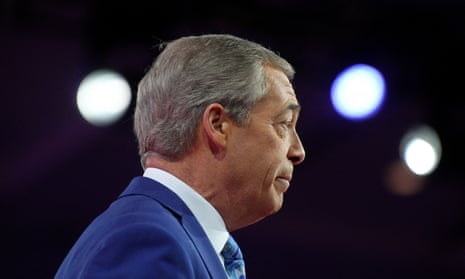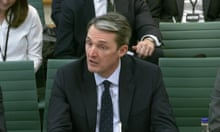The head of NatWest has apologised to Nigel Farage for what she called “deeply inappropriate comments” about the former Ukip leader in an internal report that led to the closure of his accounts at the group’s exclusive private bank, Coutts.
Dame Alison Rose issued a public statement on Thursday and wrote a letter to Farage apologising for the way the NatWest subsidiary had handled its decision to cut ties with the Brexit campaigner.
It came after a series of interventions by the prime minister and senior members of his cabinet, and more than two weeks after Farage first disclosed that his accounts had been closed by Coutts because it no longer wanted him as a client.
On Thursday night, Farage welcomed the apology from Rose but said it was only “a start” and claimed she had been forced into it by the Treasury.
An internal report had described Farage as a “disingenuous grifter” who promotes “xenophobic, chauvinistic and racist views”. After obtaining a copy and releasing it to the press, Farage had described the dossier as a “prejudiced, nasty document”.
Rose said the comments, prepared for Coutts’ wealth reputation risk committee, “do not reflect the view of the bank”. She added: “No individual should have to read such comments and I apologise to Mr Farage for this.” However, she stopped short of reinstating Farage as a Coutts client, instead reiterating an offer to open a basic account for him at NatWest.
It follows days of mounting public and political pressure, with Rishi Sunak intervening to warn it “wouldn’t be right if financial services were being denied to anyone exercising their right to lawful free speech”. The home secretary, Suella Braverman, called the decision “sinister”.
The government announced on Thursday that it would force banks to “explain and delay” any decision to close accounts. Andrew Griffith, economic secretary to the Treasury, said “banks occupy a privileged place in society” and must allow “everyone to express themselves freely” without fear of losing their access to banking.
It also ordered the Financial Conduct Authority to begin a review of the rules governing how banks treat “Politically Exposed Persons” (Peps) such as Farage over the next two months. Lasting up to a year, the review will examine whether to ease the tough rules inherited from the EU on domestic Peps while maintaining them on foreigners with bank accounts in the UK, in line with international standards.
Before Farage made the dossier public, reports had cited sources at Coutts saying that the decision to “unbank” Farage was purely because his account had fallen below its “wealth limit”, which requires customers to borrow or invest at least £1m or hold £3m in savings. The former politician fell below this threshold after his mortgage expired this year.
However, Coutts’ reputation committee report also said Farage posed a risk, accusing him of being “seen as xenophobic and racist” and of making remarks that are “distasteful and appear increasingly out of touch with wider society”.
On his GB News programme on Thursday night Farage accused Rose of being forced into an apology by the Treasury. He said: “In life it is always good to get an apology, so thank you Dame Alison for apologising. What I’ve actually been told quietly, privately, is that you were forced into doing this by the Treasury.
“But at least you’ve done it, I suppose. But the whole letter smacks of ‘not me, guv, I mean I’m just the chief executive, I mean, don’t blame me for what the banks under my direct control are doing’.”
He said there were thousands in the same position as him, as he vowed to battle on. “I’m afraid I can’t just walk away from this. I’ve started this, and I’ve got to continue. So thank you for the apology. It’s a start, but it’s no more than that.”
Rose had said it was not the bank’s policy “to exit a customer on the basis of legally held political and personal views”.
after newsletter promotion
“Both freedom of expression and access to banking are fundamental to our society,” she said. “Decisions to close an account are not taken lightly and involve a number of factors including commercial viability, reputational considerations, and legal and regulatory requirements.”
Announcing the new account closure rules, which will come into effect later this summer and are likely to be among the first post-Brexit changes to banking rules, Griffith said: “Freedom of speech is a cornerstone of our democracy, and it must be respected by all institutions.
“These changes will boost the rights of customers – providing real transparency, time to appeal and making it a much fairer playing field.”
The changes will increase the notice period for closing accounts to 90 days – giving customers more time to challenge a decision through the Financial Ombudsman Service. Banks will also be required to spell out why they are terminating an account – increasing transparency for customers and aiding their efforts to overturn decisions.
The Treasury said the changes could only be made due to new powers in the Financial Services and Markets Act 2023.
The proposed new rules follow a call for evidence launched in January, after PayPal’s temporary suspension last year of several accounts, including that of Toby Young, the social commentator and director of the Free Speech Union.
The Treasury said the changes were needed to “ensure the right balance is being struck between protecting customers, and providers’ rights to manage commercial risk”.










